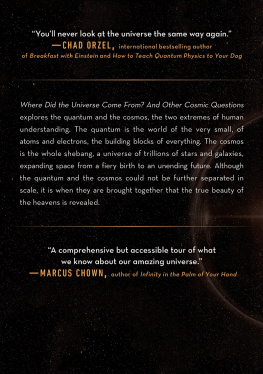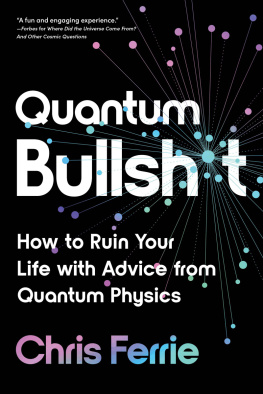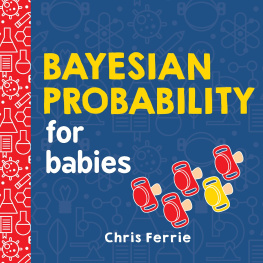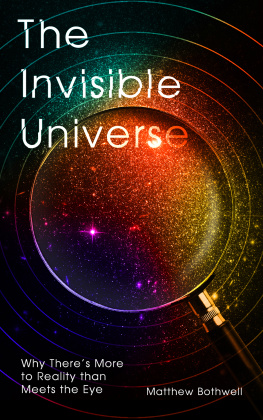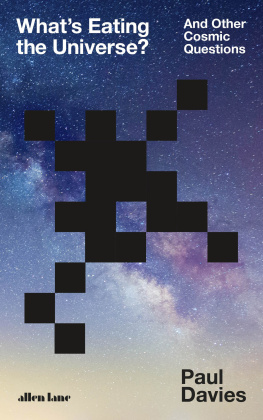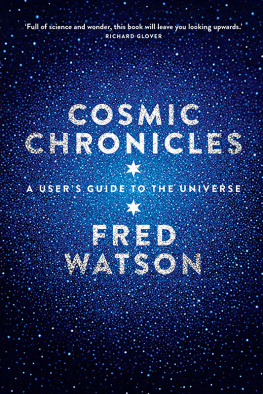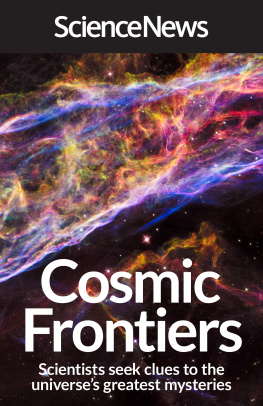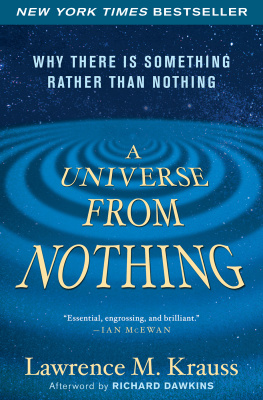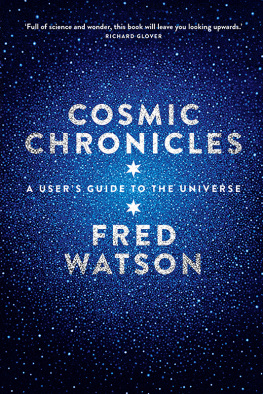Ferrie Chris - Where Did the Universe Come From? And Other Cosmic Questions
Here you can read online Ferrie Chris - Where Did the Universe Come From? And Other Cosmic Questions full text of the book (entire story) in english for free. Download pdf and epub, get meaning, cover and reviews about this ebook. year: 2021, publisher: Sourcebooks, genre: Children. Description of the work, (preface) as well as reviews are available. Best literature library LitArk.com created for fans of good reading and offers a wide selection of genres:
Romance novel
Science fiction
Adventure
Detective
Science
History
Home and family
Prose
Art
Politics
Computer
Non-fiction
Religion
Business
Children
Humor
Choose a favorite category and find really read worthwhile books. Enjoy immersion in the world of imagination, feel the emotions of the characters or learn something new for yourself, make an fascinating discovery.
- Book:Where Did the Universe Come From? And Other Cosmic Questions
- Author:
- Publisher:Sourcebooks
- Genre:
- Year:2021
- Rating:4 / 5
- Favourites:Add to favourites
- Your mark:
- 80
- 1
- 2
- 3
- 4
- 5
Where Did the Universe Come From? And Other Cosmic Questions: summary, description and annotation
We offer to read an annotation, description, summary or preface (depends on what the author of the book "Where Did the Universe Come From? And Other Cosmic Questions" wrote himself). If you haven't found the necessary information about the book — write in the comments, we will try to find it.
Ferrie Chris: author's other books
Who wrote Where Did the Universe Come From? And Other Cosmic Questions? Find out the surname, the name of the author of the book and a list of all author's works by series.
Where Did the Universe Come From? And Other Cosmic Questions — read online for free the complete book (whole text) full work
Below is the text of the book, divided by pages. System saving the place of the last page read, allows you to conveniently read the book "Where Did the Universe Come From? And Other Cosmic Questions" online for free, without having to search again every time where you left off. Put a bookmark, and you can go to the page where you finished reading at any time.
Font size:
Interval:
Bookmark:
Thank you for downloading this Sourcebooks eBook !
You are just one click away from
Being the first to hear about author happenings
VIP deals and steals
Exclusive giveaways
Free bonus content
Early access to interactive activities
Sneak peeks at our newest titles
Happy reading !
CLICK HERE TO SIGN UP
Books . Change . Lives .
Thank you for reading this Sourcebooks eBook !
Join our mailing list to stay in the know and receive special offers and bonus content on your favorite books and authors!
CLICK HERE TO SIGN UP
Books . Change . Lives .

Copyright 2021 by Chris Ferrie and Geraint F. Lewis
Cover and internal design 2021 by Sourcebooks
Cover design by Pete Garceau
Cover images dottedhippo/Getty Images
Internal design by Jillian Rahn/Sourcebooks
Internal images Chris Ferrie
Sourcebooks and the colophon are registered trademarks of Sourcebooks.
All rights reserved. No part of this book may be reproduced in any form or by any electronic or mechanical means including information storage and retrieval systemsexcept in the case of brief quotations embodied in critical articles or reviewswithout permission in writing from its publisher, Sourcebooks.
This publication is designed to provide accurate and authoritative information in regard to the subject matter covered. It is sold with the understanding that the publisher is not engaged in rendering legal, accounting, or other professional service. If legal advice or other expert assistance is required, the services of a competent professional person should be sought.From a Declaration of Principles Jointly Adopted by a Committee of the American Bar Association and a Committee of Publishers and Associations
Published by Sourcebooks
P.O. Box 4410, Naperville, Illinois 60567-4410
(630) 961-3900
sourcebooks.com
Library of Congress Cataloging-in-Publication Data
Names: Ferrie, Chris, author. | Lewis, Geraint F., author.
Title: Where did the universe come from? and other cosmic questions : our universe, from the quantum to the cosmos / Chris Ferrie, Geraint F. Lewis.
Description: Naperville, Illinois : Sourcebooks, 2021. | Includes bibliographical references and index.
Identifiers: LCCN 2021003815 (print) | LCCN 2021003816 (ebook) | (hardcover) | (epub)
Subjects: LCSH: Cosmology--Popular works.
Classification: LCC QB982 .F47 2021 (print) | LCC QB982 (ebook) | DDC 523.1--dc23
LC record available at https://lccn.loc.gov/2021003815
LC ebook record available at https://lccn.loc.gov/2021003816

ALSO BY CHRIS FERRIE
Quantum Physics for Babies and many other
books in the bestselling Baby University series
The Cat in the Box
ALSO BY GERAINT F. LEWIS
A Fortune Universe: Life in a Finely Tuned Cosmos
The Cosmic Revolutionarys Handbook
(Or: How to Beat the Big Bang)
The Quantum and the Cosmos
They say that the most incredible thing about the universe is that we can understand it. But of course, we dont completely understand itnot yet anyway.
There are many things about the universe that remain dark and mysterious. But for a slightly evolved ape whose civilization is measured in thousands of years rather than the billions of years that have marked the passage of cosmic time, humans have done quite well!
Over the last few centuries, weve successfully unraveled much of the language of the universe. Weve discovered that the rules that govern how things change and interact are not written in words but in mathematical equations. From the first steps of Galileo, Kepler, and Newton four hundred years ago, the universe has steadily given up its mathematical secrets. Seemingly mysterious phenomenasuch as electricity and magnetism, matter and light, heat and energywere explored, defined, explained, and finally articulated in the beauty of mathematical equations.
By the end of the nineteenth century, it looked like the end might be in sight. The great Lord Kelvin is rumored to have said that there was nothing new to be learned in science, and all that was left to do was to make measurements at higher and higher precision.
But this cozy view of the scientific universe was about to come tumbling down. The start of what became a series of revolutions in science can be traced to the turn of the twentieth century, when a forty-two-year-old German physicist was trying to make sense of the world.
Max Planck was trying to understand why things glowed when you heated them. Of course, many things simply burna chemical reaction that turns one substance into another. But if you have ever seen a blacksmith shoe a horse or seen a poker in a hot fire, you know that heated metal glows. At first, it glows with a rosy red, but as it gets hotter, metal can become white hot. What is the source of the color of heated metal?
Planck was not trying to explain the colors of heated metal in some general wishy-washy terms. No, he wanted to describe the observed color of hot metal preciselywhy so much red compared to blue? Remember, when you heat up something, it turns red and then white hot. The question your inner child is yearning to answer is why?
Planck was not the first to try answering this question, but everyone who came before him had failed. They derived their mathematical relationship for the color of hot metal using the laws of the universe as they understood them. They knew the light was emitted when tiny electrical chargeswhich we now know are electronsinside the metal jiggled around, oscillating back and forth. These jiggling charges emit light. Heating the metal gave these little charges more energy, so they jiggled more furiously, emitting more light. Scientists realized that the emitted color is implicitly tied to jiggling charges, so determining how the energies from the heat made the charges oscillate was key to their calculations.

Unfortunately, their mathematics failed. Scientists could correctly account for the amount of red lightlight with lower energy and longer wavelengths. Blue light, however, has more energy than red light, and their mathematics predicted there should be more blue light than red light. But they also predicted there should be even higher energy radiations, such as ultraviolet, X-rays, and gamma rays, than blue light, and this was simply not seen in experiments. This ultraviolet catastrophe marked a failure of our understanding of the physical world.
Planck, too, was on the brink of failure when he tried something radical. This was surprising because Planckas described in his obituary by fellow physicist Max Bornwas a conservative man, skeptical of speculation. Being radical was not in his nature, but he felt that he had no option. He concluded that the laws of physics, as he understood them, could not solve the problem of the color of heated metal.
The Quantum Hypothesis
Plancks revelation was to consider the jiggling of the charges as being discretecoming in indivisible chunks. Discrete might seem like a strange word to use, but its easy to think about in terms of money. Imagine that you have a stack of one-dollar bills. If I ask you count out an amount of money using this stack, you are always going to get a whole number of dollars: $0, $1, $2 With just a stack of one-dollar bills, you are never going to count out $1.23, unless you start tearing up the bills, which is a bad idea!
Next pageFont size:
Interval:
Bookmark:
Similar books «Where Did the Universe Come From? And Other Cosmic Questions»
Look at similar books to Where Did the Universe Come From? And Other Cosmic Questions. We have selected literature similar in name and meaning in the hope of providing readers with more options to find new, interesting, not yet read works.
Discussion, reviews of the book Where Did the Universe Come From? And Other Cosmic Questions and just readers' own opinions. Leave your comments, write what you think about the work, its meaning or the main characters. Specify what exactly you liked and what you didn't like, and why you think so.

